1. Introduction — Why Hannah Einbinder Matters
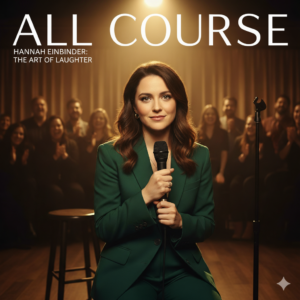
Hannah Einbinder is more than a rising comedy star — she’s a communicator of rare depth and empathy. Through her timing, tone, and truth-telling humor, she bridges laughter and meaning, showing us how connection can be both funny and profoundly human. This piece explores how Hannah’s voice — calm, clever, and courageous — is quietly reshaping the way we think about communication today.
Every once in a while, a voice arrives that doesn’t just make people laugh — it makes them listen.
Hannah Einbinder is one of those rare voices. She’s sharp without cruelty, funny without gimmicks, and deeply human in how she observes the world.
She doesn’t raise her voice to be heard. Instead, she bends silence to her advantage.
On stage, on screen, or in interviews, she communicates with a kind of elegant precision — the kind that reminds you that timing, tone, and truth are everything.
But what makes her stand out isn’t just her comedy.
It’s her understanding of communication — how to take a thought, shape it into a story, and make it land. Whether she’s performing for a live audience or trading dialogue in HBO’s Hacks, Einbinder knows how to make every word count.
She represents a new kind of communicator — one who blends intellect, emotion, and restraint in a world obsessed with noise.
In an era when everyone’s trying to shout their point across the digital void, Hannah reminds us that real communication is less about volume, and more about intention.
2. The Making of a Modern Communicator

To understand Hannah Einbinder’s communication genius, you have to start with where she came from — a home where humor was more than entertainment. It was a language.
Born on May 21, 1995, in Los Angeles, Hannah grew up surrounded by the rhythms of performance. Her mother, Laraine Newman, was one of the original Saturday Night Live cast members, and her father, Chad Einbinder, worked as a writer and actor. In her house, storytelling wasn’t just encouraged — it was expected.
But that doesn’t mean her path was automatic.
Growing up in a creative family can inspire you, but it can also shadow you. The world expects you to follow in familiar footsteps, and that pressure can crush authenticity. Hannah handled it differently. Instead of copying her parents’ style, she found her own rhythm — quieter, smarter, and rooted in emotional honesty.
From an early age, she noticed how people listen when you speak with truth — not force.
In school, she was observant, analytical, the kind of person who watches before she performs. That habit became her hidden superpower: listening. While many comedians focus on what to say next, Einbinder pays attention to what others are feeling, how silence hangs, and where laughter starts.
That’s why, when she stepped onto a stage for the first time, she didn’t just deliver jokes — she delivered moments.
Each line felt lived in, every pause intentional. Her communication wasn’t about filling time; it was about shaping it.
By the time she started performing in local clubs and small comedy festivals, Hannah’s skill set was already unusual. She had the analytical eye of a writer, the emotional depth of an actor, and the presence of someone who truly understands human conversation.
She wasn’t simply talking to people — she was talking with them.
A Childhood Tuned to Timing
Hannah Einbinder grew up in a home where laughter wasn’t just background noise — it was part of the daily rhythm.
While most kids were watching cartoons, Hannah was watching Saturday Night Live reruns and hearing stories about what it was like to create comedy live, on the spot, in front of millions.
But that environment did more than entertain her. It trained her ear.
Timing was something she absorbed by osmosis — when to speak, when to pause, and when silence could be the funniest punchline of all.
At dinner tables, humor wasn’t random. It was crafted. Conversations were full of quick wit, improvisation, and subtle performance. Hannah learned early that communication isn’t just about words — it’s about rhythm, gesture, tone, and empathy.
Unlike many who chase laughter for approval, Hannah understood humor as connection.
Her family didn’t use jokes to escape feelings; they used them to express them.
It taught her that comedy can be deeply human — a form of storytelling that reveals truth while still making people laugh.
Still, being the daughter of an SNL legend came with invisible weight. Expectations followed her everywhere. People wanted another version of her mother — but Hannah wasn’t interested in imitation. She wanted voice, not fame.
So, while others saw her lineage as a ticket in, she saw it as a challenge — to build her own identity, her own comedic signature, her own communication style that wasn’t borrowed from anyone else.
And that’s exactly what she did.
3. Finding Her Voice: The Grind of Open Mics
Before Hacks, before the late-night interviews, before her name became synonymous with sharp, graceful comedy — Hannah Einbinder was standing under cheap bar lights, speaking into microphones that barely worked.

The early comedy circuit is a test of endurance. It’s late nights, half-listening crowds, and the hum of espresso machines competing with your punchlines.
It’s also where you learn everything about communication — what lands, what doesn’t, how to read a room, and how to hold silence until it becomes part of the act.
For Hannah, open mics were not just performances; they were conversations.
She paid attention to the crowd — the lean-ins, the nervous laughter, the moments when people’s eyes softened. She wasn’t just telling jokes. She was studying response, learning to translate emotion into timing.
Her style became minimalist yet magnetic.
She didn’t over-explain. She didn’t chase laughs. She created space — and trusted the audience to fill it. That’s rare for a young comedian. Most are eager to prove themselves; Hannah was patient enough to communicate meaningfully.
And every awkward night, every missed punchline, every quiet audience was a lesson.
She realized that being a communicator means listening to failure as much as to applause.
That every silence holds information — and that discomfort, if handled gently, can become laughter.
Those early years turned her into the kind of performer who doesn’t need to dominate a room — she guides it. Her voice carries curiosity rather than control.
That’s what makes her stand out in an age of loudness — she understands that real connection comes from presence, not performance.
The Power of Stillness and Listening
When Hannah Einbinder appeared on HBO’s Hacks as Ava Daniels — the ambitious, edgy comedy writer paired with Jean Smart’s legendary Deborah Vance — she didn’t just step into a role; she stepped into a conversation.
Ava wasn’t designed to be loud or over-the-top. She was written to clash, to challenge, and to reveal. And that required a kind of communication most performers rarely master — the power of stillness.
Watch Hannah in any scene of Hacks, and you’ll notice something subtle but extraordinary: she listens.
Her reactions aren’t exaggerated; they’re intentional. Her eyes move slightly, her posture shifts just enough to signal discomfort or connection. She lets silence breathe, allowing emotions to echo before responding.
That’s rare in television — an industry built on speed, punchlines, and constant movement. But Hannah uses pause as part of her dialogue. She makes the audience lean in, not because she demands attention, but because she earns it.
Communication, at its core, isn’t just speaking — it’s listening actively, feeling deeply, and responding authentically.
Hannah’s portrayal of Ava reminded viewers that the most powerful communicators aren’t those who talk the most, but those who know when not to.
Off-screen, she carries that same grounded energy. In interviews, she listens carefully to questions, often taking a small moment before answering — a thoughtful pause that signals she values clarity over performance. It’s refreshing, especially in an era of instant replies and rehearsed answers.
Her stillness doesn’t come from hesitation. It comes from confidence — the kind that says, “I don’t need to fill silence to be understood.”
That quiet authority is what makes her both magnetic and memorable.
4. Hacks: When Storytelling Meets Dialogue Mastery
Hacks isn’t just a show about comedy; it’s a show about communication — generational, emotional, and creative. And Hannah Einbinder plays the bridge between two worlds: the old-school wit of Deborah Vance and the raw, digital-age directness of Ava.
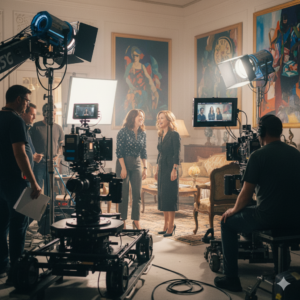
In the beginning, Ava’s character is brash, self-righteous, and addicted to irony — the kind of person who uses humor to deflect emotion. Deborah, on the other hand, communicates through craft — through every pause, tone, and story told with the precision of a veteran performer.
Watching Hannah navigate that dynamic is like watching two different communication philosophies collide — and then slowly harmonize.
She doesn’t overpower Jean Smart’s performance; she matches it with subtle energy, meeting each sarcastic jab with vulnerability, every silence with an unspoken understanding.
Through Ava, Hannah shows that communication evolves when you’re brave enough to unlearn what you know.
She starts the series defending herself with words, but by the end, she speaks volumes through empathy. The show becomes less about jokes and more about how two women learn to listen — really listen — to each other.
Behind that transformation is Hannah’s intuitive sense of rhythm. Her dialogue never feels memorized; it feels lived in. She knows how to pace a conversation — when to push, when to retreat, when to let emotion hang in the air.
That’s the difference between performance and connection.
Hannah doesn’t just act — she communicates. And that’s why her scenes linger long after the credits roll.
In Hacks, she turns dialogue into music — every word measured, every silence a note, every look a chord that deepens the melody.
The Art of Being Awkward on Purpose
There’s a special kind of brilliance in being comfortable with discomfort — and Hannah Einbinder has mastered it.
Most people try to hide their awkwardness. Hannah uses it. She shapes it into a rhythm, an aesthetic, a tool that turns vulnerability into art.
On stage, she doesn’t rush through pauses or fill silences with nervous laughter. Instead, she lingers in them — like she’s letting the audience sit with the truth she just dropped. That’s where the magic happens. The tension turns into humor, and the humor turns into understanding.
Her comedy often dances between irony and sincerity. She can deliver a line that sounds detached one second and heartbreakingly human the next. That unpredictable tone keeps people engaged, because they’re not just hearing jokes — they’re feeling emotions shift in real time.
And what makes this even more powerful is that Hannah’s awkwardness is never accidental. It’s crafted communication.
She knows how to use body language — the tilt of a head, the slow blink, the stillness of her hands — to amplify meaning. It’s not just performance; it’s conversation in motion.
Many comedians rely on noise — fast pacing, exaggerated expression, or heavy punchlines. Hannah goes the opposite way. She slows things down. She allows space for laughter to find its own timing. She makes you aware of your own reactions.
In that still, awkward space, she’s not just telling you a story — she’s inviting you into it.
And that’s what makes her so distinct: she doesn’t fear awkwardness; she wields it.
Her humor reminds us that connection doesn’t always come from smoothness — sometimes, it’s the jagged, human edges that make communication truly real.
Comedy as Conversation
If you look closely at Hannah Einbinder’s stand-up and acting, you’ll notice one central truth — she doesn’t treat comedy as a monologue. She treats it as a dialogue.
Every performance feels like a shared moment between her and the audience.
She doesn’t just tell jokes; she tests them. She watches how people react — not to chase approval, but to understand what resonates, what hurts, what heals.
That’s communication in its purest form: listening while speaking.
In interviews, Hannah has often said that her comedy comes from observation — from noticing how people talk, how they hide pain with humor, how tone can change meaning completely. She picks up on the subtext of human interaction — the quiet hesitations, the coded jokes, the defensive laughter.
That’s what makes her work so intellectually refreshing. She treats her audience like collaborators, not spectators. Each show feels like an ongoing exchange — unpredictable, alive, and deeply human.
In that sense, Hannah is more than a performer; she’s a communicator of emotion.
She speaks, waits, listens, adjusts — the same way great conversationalists do.
And when the lights fade and the laughter softens, people don’t just remember her jokes. They remember how they felt when they heard them — seen, understood, and part of something real.
5. Everything Must Go — How Her Stand-Up Reinvents Connection
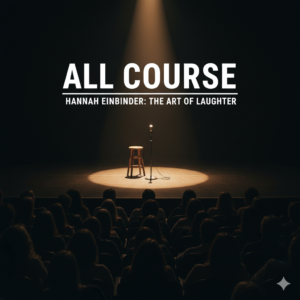
When Hannah Einbinder steps onto a stage, there’s an energy that feels different — not loud, not flashy, but real. She doesn’t rush to dominate the room; she lets it breathe.
Her 2023 stand-up special, Everything Must Go, captures that perfectly. It’s a show that feels less like a performance and more like a deep, funny, unexpected conversation about being human.
At first glance, the title sounds like a simple joke — a reference to clearance sales or emotional baggage. But if you listen closely, you realize it’s a metaphor for release.
The act of letting go. Of perfection. Of pain. Of everything that keeps us from speaking honestly.
In this special, Hannah explores anxiety, identity, love, and the absurdity of modern life with both sharpness and softness.
She moves seamlessly between clever wit and emotional reflection — a balance few can maintain.
One minute, she’s delivering a line that makes you laugh out loud; the next, she’s offering a truth so raw it leaves you still.
That’s her genius.
She doesn’t separate humor from heart — she merges them.
Every laugh carries a hint of understanding, every moment of silence feels full of meaning.
In Everything Must Go, she also experiments with form — her pacing, tone, and gestures work like instruments.
She speaks softly, pauses intentionally, and sometimes lets the crowd sit in the emotion without immediately relieving it.
It’s brave, because silence on stage can feel like danger — but for Hannah, it’s communication. It’s the part of the conversation where the audience thinks, “Oh… I’ve felt that too.”
That’s what makes her comedy so connective.
It’s not about escaping life’s awkwardness; it’s about naming it, holding it up to the light, and laughing together at its strange beauty.
She turns vulnerability into rhythm, truth into laughter, and storytelling into empathy.
How She Uses Vulnerability as Power
For many performers, vulnerability is something to hide — a crack in the surface. But for Hannah Einbinder, it’s her foundation.
She understands that communication without vulnerability is just noise.
Her humor, interviews, and performances all come from a place of emotional honesty — the kind that builds trust between her and her audience.
When she talks about mental health, relationships, or self-doubt, there’s no wall between her and the people listening. She speaks like someone who’s lived through what she’s describing — and she does it without self-pity or pretense. That’s rare.
She once described stand-up as a form of “spiritual purging” — a way to turn personal chaos into shared clarity.
That’s what real communicators do: they transform private emotions into universal language.
Vulnerability, in Hannah’s world, isn’t weakness — it’s power dressed in truth.
When she admits to fear, the audience exhales theirs. When she jokes about anxiety, people feel seen instead of judged.
That’s not just comedy — that’s healing through humor.
And she does it with grace. She never overshares or forces sympathy. Her storytelling walks the fine line between humor and heartache — and that’s where her art lives.
You can sense it in her tone, her posture, her pauses.
Each element works together like a carefully composed melody, guiding people through laughter to reflection, and back again.
Hannah proves that to communicate effectively — on stage, in art, or in life — you don’t have to be perfect. You just have to be present.
Her voice says, “It’s okay to feel uncertain, to be awkward, to not have the answers.”
That’s the kind of honesty people crave. That’s the kind of connection that lasts.
6.The Rhythm, Tone, and Architecture of Her Communication
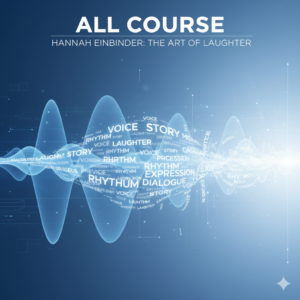
If you listen closely to Hannah Einbinder — whether she’s performing a stand-up bit, acting in Hacks, or speaking in an interview — you’ll notice something deliberate in her delivery. Everything has rhythm. Everything has architecture.
Her communication isn’t random; it’s sculpted.
She builds her ideas like a composer layering sound — a pause here, a lift in tone there, a soft drop at the end of a sentence to draw you closer.
Comedy has always been about timing, but Hannah’s timing feels different. It’s not mechanical; it’s musical.
Her cadence follows thought, not formula. You can hear her thinking, almost like she’s writing the next sentence in real time. That rawness makes her communication feel alive.
She often uses contrast — pairing intellectual language with absurd humor, or following a deep observation with a self-deprecating twist. This keeps her audience on their toes, constantly engaged, never fully comfortable — and that’s the point.
She doesn’t want passive listeners; she wants participants.
Her tone is another layer of brilliance.
It carries warmth without losing wit, confidence without arrogance. There’s a sense of grace in how she speaks — even when she’s being sarcastic.
That’s what makes her humor hit deeper: it’s not cruel or defensive; it’s empathetic. She laughs with, never at.
Visually, her communication extends beyond words.
Her posture — upright but relaxed — signals openness. Her hand gestures are subtle but meaningful, used to punctuate rhythm rather than distract from it. Even her wardrobe choices in performances reflect tone: simple, timeless, unpretentious. She lets her presence do the talking.
This combination of rhythm, tone, and restraint is what gives her communication its power.
She doesn’t try to fill the room; she lets the space speak back to her.
It’s a masterclass in mindful expression — the kind of communication that says more through simplicity than through showmanship.
Lessons Communicators Can Learn from Her
You don’t have to be a comedian or actor to learn from Hannah Einbinder.
Her way of connecting offers timeless lessons for anyone who wants to speak, lead, teach, or simply be heard.
1. Listen before you speak.
Hannah’s strength lies in her observation. She watches people, situations, and silences.
True communication begins with understanding — and you can’t understand if you’re always trying to talk first.
2. Use silence as part of your message.
Where most people fear silence, Hannah uses it.
She knows that a pause can carry emotion, anticipation, or reflection. In conversation, silence isn’t emptiness — it’s space for meaning to land.
3. Be authentic — even when it’s messy.
Hannah doesn’t hide awkwardness or imperfection; she uses them.
Authenticity builds trust. People don’t connect with perfect; they connect with real.
4. Humor is empathy in disguise.
Her jokes are never just jokes. They’re a way of saying, “You’re not alone.”
Using humor in communication — even in serious spaces — can soften tension, create relatability, and open dialogue.
5. Find rhythm, not rehearsed polish.
Hannah’s communication feels organic because it’s alive. She adjusts, reacts, and adapts.
The best communicators don’t memorize their message; they feel it.
6. Lead with vulnerability.
Instead of presenting herself as untouchable, she lets her audience see her humanity.
That honesty transforms her from performer to connector — and that’s where true influence lives.
In a culture obsessed with confidence, Hannah shows that the real strength lies in presence.
When you show up fully — with sincerity, curiosity, and self-awareness — you don’t have to shout to be heard.
Your truth will do the speaking for you.
7. The Human Behind the Humor
Behind every brilliant communicator is a person — complex, layered, and quietly evolving.
For all her success and acclaim, Hannah Einbinder remains refreshingly grounded. She doesn’t play the role of a celebrity; she plays the role of a human being who happens to make art.

What makes her presence so compelling is that it feels unmanufactured. She doesn’t chase perfection or polish her edges to fit an image. Instead, she’s open about the contradictions — being confident yet anxious, witty yet deeply thoughtful, public yet private.
That duality is part of what makes her communication resonate.
She speaks not from a pedestal, but from eye level. Her humor doesn’t come from superiority — it comes from shared experience. When she jokes about insecurity, it’s not to mock it; it’s to connect through it.
In interviews, Hannah often reflects with an almost poetic clarity. She talks about fear, creativity, and identity with the honesty of someone who has lived through the quiet struggle of figuring herself out.
That emotional intelligence translates directly into her art.
She doesn’t just perform feelings; she understands them.
That’s why her comedy feels intimate — it’s not about making people forget their worries, it’s about helping them recognize the beauty inside them.
Offstage, she’s an advocate for mental health and emotional awareness. She’s spoken about the importance of boundaries, rest, and authenticity — topics rarely discussed in the high-pressure world of entertainment.
For many, that vulnerability makes her not only relatable, but quietly inspiring.
Because here’s the truth: in a culture that rewards constant performance, Hannah Einbinder’s greatest act is being herself.
And that’s what makes her such an extraordinary communicator — she leads not by pretending to be more, but by daring to be enough.
What’s Next for Hannah Einbinder
It’s clear that Hannah Einbinder is just getting started. Her career is already remarkable — Emmy nominations, critical acclaim, a successful stand-up special — but her journey feels like it’s only beginning to unfold.
What makes her future so exciting isn’t just the projects she might take on, but the kind of communicator she’s becoming.
Hannah isn’t interested in chasing trends or replicating formulas. She’s shaping her career with intention — choosing roles, stories, and collaborations that align with her voice and values.
In recent interviews, she’s hinted at wanting to write and create her own material — something that feels inevitable for an artist who communicates with such nuance and awareness.
Her next chapter could easily move beyond performance into authorship — screenwriting, producing, or storytelling in new, experimental formats.
And wherever she goes, one thing is certain: she’ll continue to redefine what it means to speak truthfully.
In an age of filters and algorithms, Hannah’s work feels like a counterbalance — a reminder that real stories, told with heart and humor, still matter.
Her influence already reaches beyond comedy. Young performers cite her as proof that you can be both smart and sincere, funny and vulnerable, feminine and strong — without contradiction.
She’s showing a generation that communication doesn’t have to be loud to be powerful; it just has to be real.
Whether she’s behind a microphone, on a set, or in a quiet interview chair, Hannah Einbinder represents a shift — from performance to presence, from entertainment to empathy.
And maybe that’s her greatest legacy in the making: not just being a brilliant comedian or actress, but a communicator who teaches us all how to slow down, listen better, and speak from the heart.
The Voice That Keeps the Room Listening
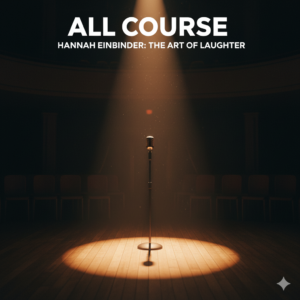
There’s something unforgettable about the kind of voice that doesn’t just speak, but stays with you.
Hannah Einbinder has that voice — the kind that lingers long after the laughter fades. It’s not simply her timing, wit, or phrasing; it’s the way she communicates humanity through humor.
She doesn’t shout to be heard. She doesn’t rush to impress. Instead, she lets silence, sincerity, and sharp observation do the work. That quiet confidence — that ability to connect without forcing it — is rare in today’s world of constant noise.
In a sense, Hannah has redefined what it means to communicate in the 21st century.
She reminds us that the most powerful messages aren’t always the loudest ones; they’re the most authentic. Her comedy, acting, and interviews all share one thread — a devotion to truth, vulnerability, and connection.
And that’s what communication, at its core, really is: the art of understanding and being understood.
Hannah Einbinder doesn’t just perform for audiences — she invites them into a shared emotional space. Her words carry empathy, her pauses carry meaning, and her humor carries hope. Whether she’s on stage, on screen, or off the record, she represents a rare kind of grace: someone who can make you laugh while reminding you to think, to feel, and to care.
In an era obsessed with performance, she stands as proof that presence is what truly moves people.
You don’t have to be perfect to connect — you just have to be real.
And maybe that’s why she resonates so deeply.
Because when Hannah Einbinder speaks, we don’t just hear a comedian.
We hear a communicator — one who understands that the best way to reach the world is by speaking from the heart.
Her voice — calm, clever, and endlessly human — reminds us of something timeless:
That no matter how much technology changes the way we talk, the soul of communication will always belong to those who listen, laugh, and love without pretending.
And Hannah Einbinder?
She’s not just keeping the room listening — she’s teaching the world how to speak its truth.

